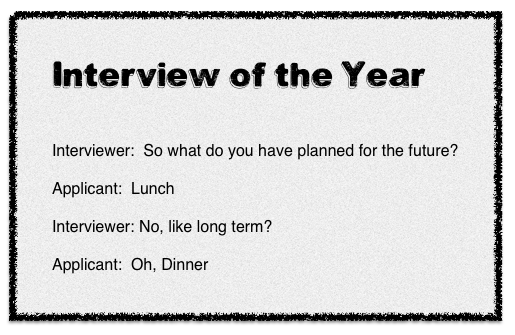
Distribution of Interview Invitations
Here's why it's really important to apply early for the best chance of getting an interview Invitation:
Read more: Distribution of Interview Invitations

Here's why it's really important to apply early for the best chance of getting an interview Invitation:
Read more: Distribution of Interview Invitations

Read more: Barone's Interview Tips

Read more: Consejos para la entrevista

Behavioral Questions used during the Interview
During and interview, it's easy for an applicant to say “I'm a really hard worker” or “I am very reliable”.
Anyone can say it... we want you to prove you have the traits that we are looking for in a future resident.
As things become more and more competitive, many programs are starting to use “behavioral questions” during the interview. Behavioral questions are open ended questions that require you to go back into your past and provide a story that demonstrates how you handled a situation. This can give the interviewer some insight into your thought process. We want to see how you acquired the trait or skill and how you have used it.
Read more: How to Answer Behavioral Interview Questions

You only get one chance to make a great impression!
Leave nothing to chance. Prepare like crazy for your residency interviews! 

Read more: Interview Tips from Students on the Interview Trail

Here are some good resources for preparing for your interviews:
Read more: Interview Preparation Resources
by Eric Goldwaser

The advice that I give to medical students is the importance of research - not just in doing it and having an appreciation for it, but in KNOWING it.
At my first national conference where I was presenting some research, I began to wander around to the other posters and started asking students to talk about their work. I found, to my surprise, that the vast majority of people cannot talk about their research that has THEIR own name on it, for a substantial amount of time, or with anything of substance or weight to it.
So, I took this notion of the difference between DOING research, and KNOWING it, to heart. I now ask everyone who I interview to tell me about the research that is on their resume. It is painstakingly transparent the students who don't know what they did in lab. But moreover, it says something about their character. If a student does not care much for research, which I understand is a vast majority, then it means that they are doing something that they HAVE to do. The thing is though, you are going to have things that you don't want to do for the rest of your life, ESPECIALLY in medical school and beyond. So, to not give 100% of your effort and attention to something like research translates to all the other things that you will not want to do down the road but will have to do.
The point of the story is to emphasize how important it is to know the research that you did - not every pipette and intricacy, but enough to have an in-depth conversation about it. If you put research on your resume and can't convince your interviewer that you had a vested interest in it, it begs the question about the legitimacy of the rest of the resume.
Finally, if you are presenting your work at a conference, you need to have three talks ready to disperse at a whim - a 3 minute one, a 5 minute one, and a 10 minute one. You must also be able to speak to either a PhD, knowledgeable in your field of research, or to a 75 year old family medicine doctor without an ounce of knowledge of your field of research, because most likely the judges will be one of those two categories.
Best of luck with your research and interviews!